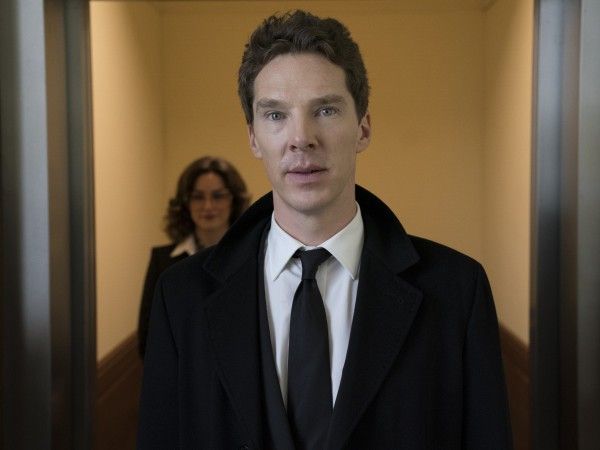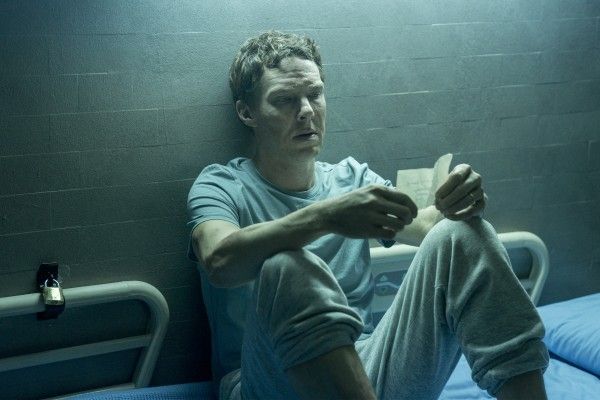Benedict Cumberbatch is the name, and this time, Patrick Melrose is the game. Based on the novels of Edward St Aubyn, Showtimes 5-episode limited series follows the exploits of a wealthy and deeply troubled Englishman (Cumberbatch), as he battles his demons and overcomes addiction. The series, adapted by David Nicholls (Far From the Madding Crowd) and German director Edward Berger (Deutschland 83), is punchy and manic, and walks a fine line between being wonderfully glib and woefully grim. But its success hinges almost entirely on Cumberbatch, who throws himself into the role of Patrick with exceptional gusto. And Patrick needs it, because he’s a terribly smart, damaged, charming, and irritating individual. A role this big can only be played by someone who understands the importance of nuance, or it could spin out of control.
In its first episode, Patrick Melrose introduces us to our protagonist in the 1980s, as he punishes his body with an escalating amount of drugs. He’s partial to heroin, but in an attempt to wean himself off he uses a cocktail of valium, cocaine, quaaludes, alcohol, and speed, much of which he buys on the street in New York while traveling there to pick up the ashes of his recently deceased father. It’s a kaleidoscopic experience for both us and Patrick, who continues to be haunted by cryptic flashbacks related to the father he hated. Cumberbatch is absolutely on fire here, channeling the late Robin Williams as he spins through various quotes and accents and impressions, with Patrick soaring on various highs (and lows) as the drugs pingpong his emotions. He appears, at first, as a privileged and indulgent man who appears to only want to live life in the shallows, yet it skews towards interesting rather than vexing because of Cumberbatch’s charisma. Patrick is incredibly frustrating, but Cumberbatch infuses his portrayal with a physical humor that smooths out the harsh edges and replaces them with a buffoonish charm.
The second hour slows down and returns to Patrick’s childhood in the 1960s (Sebastian Maltz affectingly plays a young Patrick), and the location of a horrific incident of abuse that would change his life forever. Here in this more cloistered environment, we explore life among the eccentricity, whimsy, and callousness of the exceptionally wealthy. Patrick’s father David (a brilliantly menacing Hugo Weaving) terrifies his family and all who know him, while Patrick’s American mother Eleanor (Jennifer Jason Leigh) is mostly drugged out of her mind to get her through the experience. Tales of cruelty and casual humiliation are constant, and come mostly from the gift that is Pip Torrens as David’s critical and sardonic friend Nicholas Pratt. But every actor who appears in the series is a delight, including Indira Varma as an American who is tired of David’s tyranny, and Holliday Grainger as a young social climber who is amused by the Englishness of it all.
Each episode of Patrick Melrose is based on a different St Aubyn novel, which means each has a unique setting as aesthetic (and often time frame), although Nicholls and Berger wisely keep everything tied together tonally. There is an experience to be had watching Patrick Melrose, one that captures your attention and won’t release you until it is finished telling its tale. Berger’s camera is rarely still, and Nicholls’ script is layered with clever and sometimes very meaningful dialogue, all of which is reflective of its titular character’s nature: Patrick is restless in body, mind, and soul.
By the third episode (the final one available for critics), Patrick has sobered up -- or been forced to sober up -- enough to see that he has to change his life in order to contribute something to the world. He has to confront the horrors of his past to move forward. The setting again moves, this time to 1990, and mostly revolves around an opulent party attended by many figures from Patrick’s past (as well as Harriet Walter’s wonderfully dry take on Princess Margaret). It also satirizes this world full of “social climbers and museum pieces,” as Patrick puts it, and yet can turn on a dime to expose the most vulnerable emotional moment of any character, including Patrick. (There’s a particularly great sequence where Patrick is trying to talk about his past with a trusted friend, but they are continually interrupted by a well-meaning waiter, who he lambasts It's one of the most grounded moments of the series so far, incorporating humor, frustration, sadness, and forgiveness).
That hour ends with Patrick left on the precipice of change, though whether or not it will happen remains to be seen. But the emotionally raw and bracingly witty series has, at this point, already left half a lifetime’s worth of material to be experienced. Every vignette of upperclass life that revolves around Patrick’s journey is just as worthy of exploration as his own, and as the series delightfully (and sometimes devastatingly) dips in and out of their lives, it’s a privilege to be on the ride.
Rating: ★★★★★ - Excellent
Patrick Melrose premieres Saturday, May 12th on Showtime.






